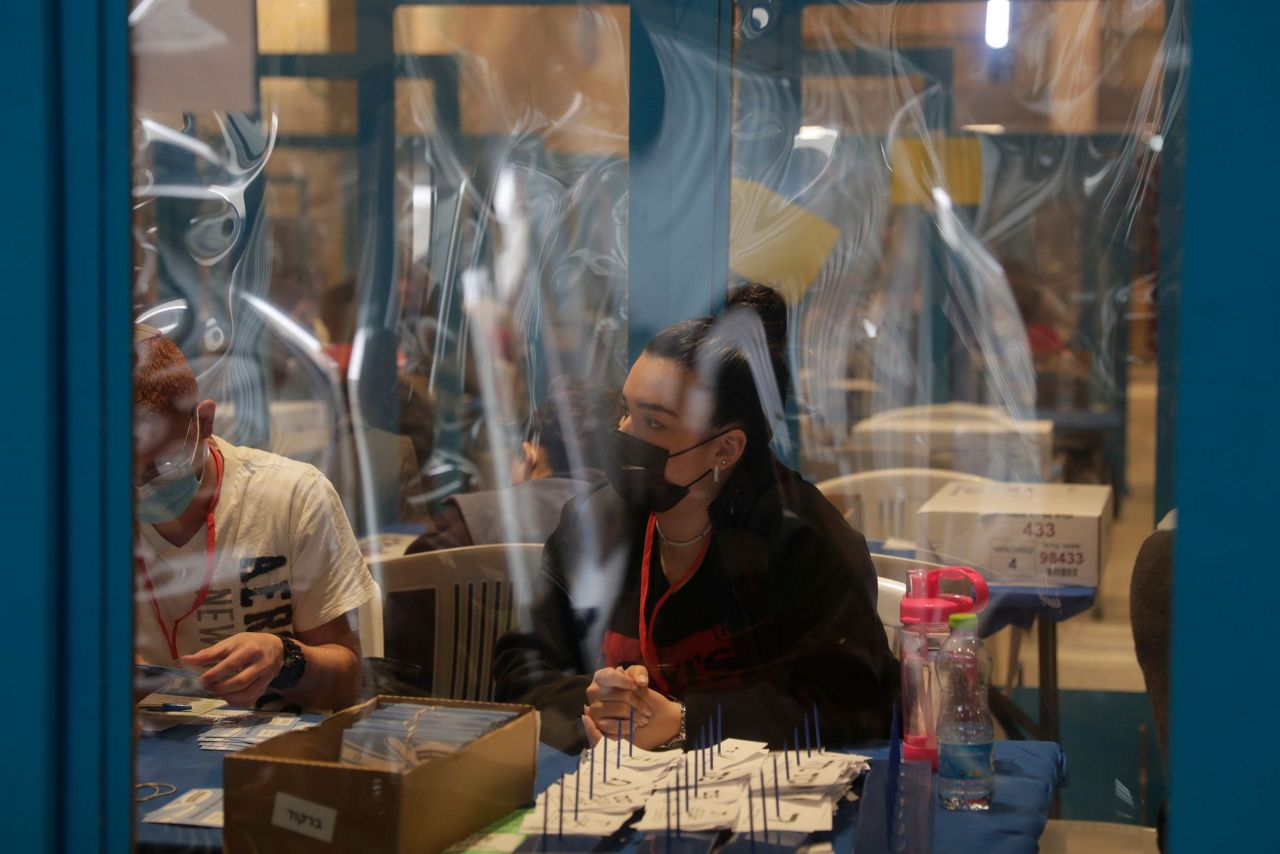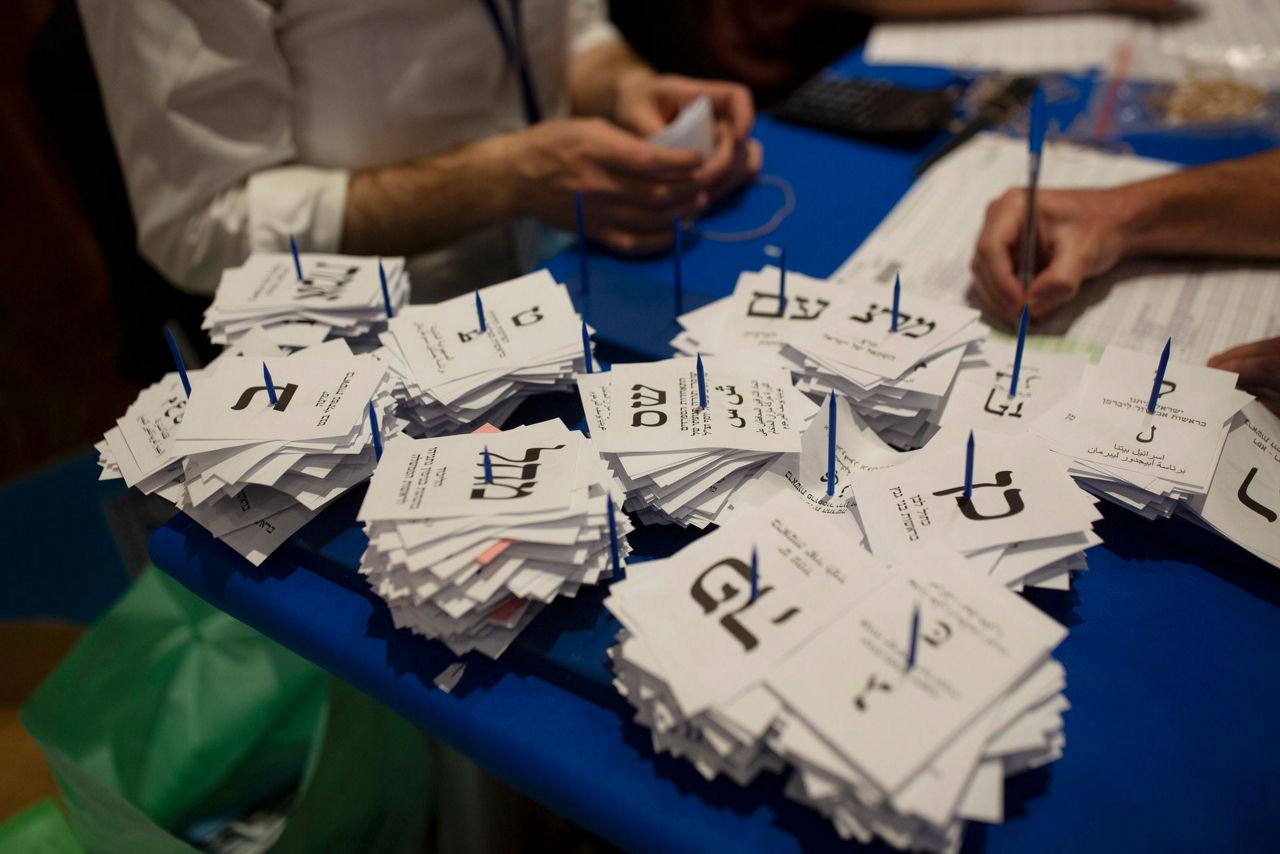JERUSALEM (AP) — Prime Minister Benjamin Netanyahu and his right-wing allies fell short of winning a parliamentary majority in Israel’s latest election, according to a final vote count released Thursday, leaving a political deadlock that put the long-time leader’s future in question.
The fourth election in just two years brought a stinging rebuke for Netanyahu, the most dominant figure in Israeli politics in a generation. Adding to the pain, he lost ground to former partners who vowed never to sit in a government with him again.
Under Israel’s fragmented political system, Netanyahu could still try to reach across the aisle and cobble together a governing coalition. But the makeup of the new parliament will make that extremely difficult, giving his opponents the upper hand in coalition talks. It's also quite possible Israel will go into a fifth election later this year.
“It is clear that Netanyahu does not have a majority to form a government under his leadership,” said Gideon Saar, one of the former Netanyahu allies who now oppose him. “Action must now be taken to realize the possibility of forming a government for change.”
In order to form a government, a candidate must work with allied partners to secure a 61-seat majority in the Knesset, or parliament.
According to the final results released by Israel’s election commission, Netanyahu and his allies captured 52 seats, compared to 57 held by his opponents.
In the middle were two undecided parties: Yamina, a seven-seat nationalist party headed by a former Netanyahu lieutenant, and Raam, an Arab Islamist party that won four seats.
Neither Naftali Bennett of Yamina nor Mansour Abbas of Raam has committed to either camp. Yet deep divisions in both the pro-Netanyahu and anti-Netanyahu blocs could make it difficult for either side to secure a majority with them.
“Israel is experiencing its worst political crisis in decades. It’s apparent that our political system finds it very difficult to produce a decisive outcome,” said Yohanan Plesner, president of the Israel Democracy Institute. “This is as a result of inherent weaknesses in our electoral system, but it’s also because of the Netanyahu factor.”
Tuesday’s vote was widely seen as a referendum on Netanyahu’s leadership style and fitness to rule while under indictment. “Israelis are split right down the middle on this question,” Plesner said.
Netanyahu’s supporters see him as a statesman uniquely qualified to lead the country. He campaigned on his management of the country’s successful coronavirus vaccination program and diplomatic agreements reached last year with four Arab countries.
His opponents, however, say Netanyahu is untrustworthy and has bungled many aspects of the coronavirus crisis. They also say he should not be running the country at a time when he is on trial on multiple corruption charges. The evidentiary phase, in which a series of former aides are to take the stand against him, is set to begin on April 5.
Thursday’s results set the stage for weeks of uncertainty as the country’s figurehead president, Reuven Rivlin, consults with party leaders to see if they can agree on a candidate who can cobble together a new governing majority.
Merav Michaeli, whose center-left Labor party won seven seats, declared victory for the anti-Netanyahu camp. “Now it is time to form a government,” she told Channel 13 TV.
That may not be so simple. The anti-Netanyahu camp includes a diverse array of parties ranging from leftist Arab factions to hard-line nationalists opposed to cooperation with them.
One option floated on Thursday was the possibility of using their slim parliamentary majority to pass legislation that would disqualify an indicted politician from forming a new government, a measure aimed at barring Netanyahu from office. Several parties said they were leaning in that direction.
Netanyahu is on trial for fraud, breach of trust and accepting bribes in three cases. He has denied any wrongdoing and has dismissed the charges as a witch-hunt by a biased law enforcement and media. His opponents accuse him of leading the country into repeated elections in hopes of winning a parliament that would grant him immunity from prosecution.
Dani Dayan, a member of Saar’s New Hope party, said he wasn’t thrilled about pursuing a “personalized” law but said it was worth considering.
“Netanyahu has made such a mishmash between his lawsuit and the needs of the state. Therefore, there’s room for debate on the matter,” he said.
Netanyahu’s Likud party issued an angry statement comparing his opponents to the clerical leadership in Iran, which vets candidates for office. “The ‘change bloc’ is just a nice way of saying an ’anti-democratic bloc,” Likud said.
Despite the charges against him, Netanyahu’s Likud party received around a quarter of the votes, making it the largest party in parliament. A total of 13 parties received enough votes to enter the Knesset — the most since the 2003 election — leaving the parliament divided among a host of midsize parties representing ultra-Orthodox Jewish, Arab, secular, nationalist, and liberal factions.
For Netanyahu to secure a majority, he would likely need to bring in both Bennett, who leads a party popular with hard-line Jewish nationalists, and Abbas, whose party is inspired by the regionwide Muslim Brotherhood movement. Bennett has ruled out an alliance with Abbas.
In another blow to Netanyahu, Bezalel Smotrich, an ally of the prime minister and head of the far-right Religious Zionism party, said Thursday that “a right-wing government will not be established with support from Abbas. Period. Not on my watch.”
Netanyahu will also try to look for individual lawmakers on the other side of the aisle to “defect” and join him.
That, for now, looks like a longshot given the hostility toward the prime minister.
Bennett, Saar and Avigdor Lieberman, leader of the secular nationalist Yisrael Beitenu party, are all former Netanyahu confidants who had messy breakups with the prime minister.
Benny Gantz, leader of the Blue and White party, formed a power-sharing deal with Netanyahu last year, only to see it quickly disintegrate amid nonstop infighting.
Netanyahu’s opponents will also explore various possible combinations that could secure the required 61-seat majority. This could include luring Netanyahu’s ultra-Orthodox allies and even disgruntled members of Likud.
The mind-boggling array of possibilities means that weeks of uncertainty most likely lie ahead, with a chance of an unprecedented fifth consecutive election if an alternative coalition cannot be found.
Late Thursday, Yair Lapid, whose centrist Yesh Atid party finished second with 17 seats, announced he had met with Michaeli and “discussed options for cooperation to build a coalition for change.”
It said they agreed to “meet again and continue discussions.”
Copyright 2021 The Associated Press. All rights reserved. This material may not be published, broadcast, rewritten or redistributed without permission.





